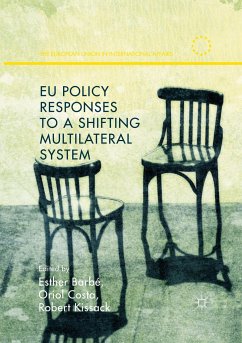
EU Foreign Policy in a Fragmenting International Order
Versandkostenfrei!
Versandfertig in 6-10 Tagen
38,99 €
inkl. MwSt.

PAYBACK Punkte
19 °P sammeln!
This open access book delves into the responses of EU actors, such as member states, institutions, and political groups in the European Parliament, to the fragmentation of the liberal international order (LIO). The analytical framework adopted in this volume explores the diverse interpretations of this phenomenon and the various political initiatives associated with them. Among these interpretations is the concept of strategic autonomy, which has emerged as a key feature of debates surrounding the EU's adaptation to a fragmented LIO. The contributors examine these dynamics across different iss...
This open access book delves into the responses of EU actors, such as member states, institutions, and political groups in the European Parliament, to the fragmentation of the liberal international order (LIO). The analytical framework adopted in this volume explores the diverse interpretations of this phenomenon and the various political initiatives associated with them. Among these interpretations is the concept of strategic autonomy, which has emerged as a key feature of debates surrounding the EU's adaptation to a fragmented LIO. The contributors examine these dynamics across different issue areas and dimensions of EU foreign policy, encompassing the Common Foreign and Security Policy (CFSP), external relations, and the externalization of internal policies. They use the term fragmentation to refer to a bundle of processes affecting the LIO that range from challenges to the universality of human rights to the crisis of global governance instruments, from the bifurcation oftech to protectionist tendencies in trade policies.














